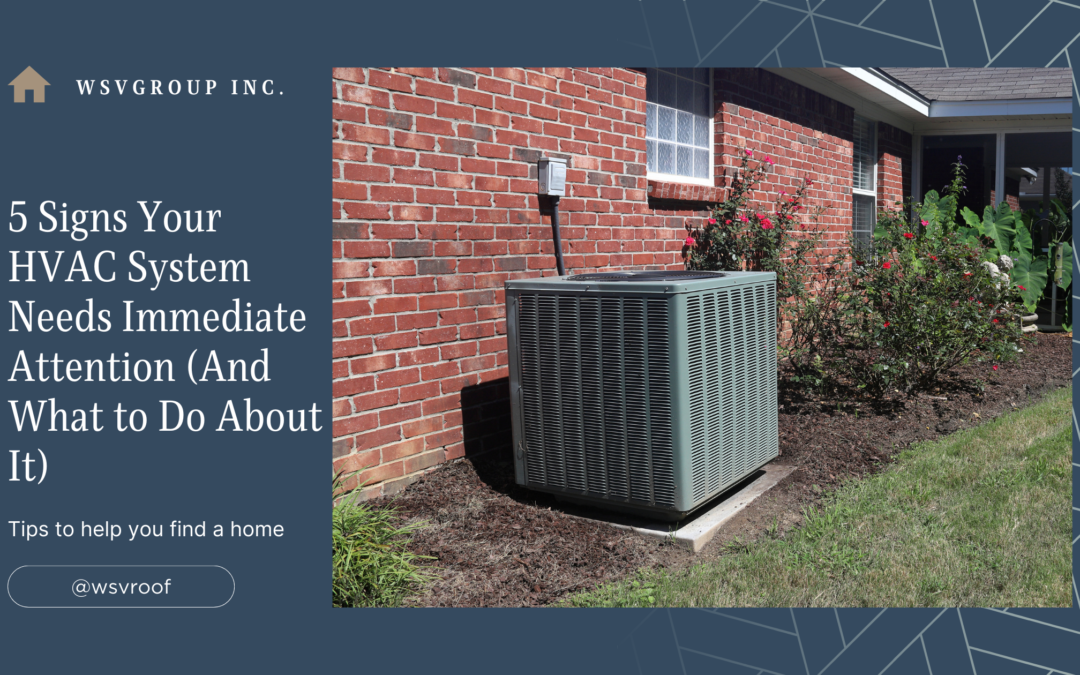Your HVAC system works hard to keep your home comfortable, but sometimes it gives subtle (and not-so-subtle) warnings when it needs professional attention. Ignoring these signs can lead to bigger problems, higher energy bills, or even complete system failure.
Here are 5 critical signs that your AC or heater might be in trouble—and what you should do about them.
1. Sudden Increase in Energy Bills
Symptoms: Your energy bills have spiked unexpectedly without any significant change in usage.
What This Means:
- Your system is working harder than usual, which could mean dirty components, a refrigerant leak, or failing parts.
- It may also signal poor energy efficiency due to an aging system.
What to Do:
- Check your air filters and replace them if they’re dirty.
- Inspect your thermostat settings to ensure it’s programmed correctly.
- Schedule a professional inspection to identify the source of the inefficiency.
Ignoring rising energy bills can cost you hundreds of dollars over time and put unnecessary strain on your HVAC system.
2. Weak or Warm Air Coming From Vents
Symptoms: Your AC is blowing warm air, or the airflow feels too weak.
What This Means:
- There could be a refrigerant leak, which affects your AC’s ability to cool.
- The blower fan may be malfunctioning, or there could be a blockage in your ductwork.
What to Do:
- Ensure the thermostat is set to the correct temperature and mode (cool or heat).
- Check vents for blockages and remove obstructions like furniture or dust buildup.
- If airflow is still weak, call an HVAC technician to inspect the system and check for refrigerant issues or fan malfunctions.
3. Strange Odors Coming From the System
Symptoms: You notice musty, burning, or foul odors when the AC or heater turns on.
What This Means:
- Musty smell: Mold or mildew might be growing in your ducts or evaporator coil.
- Burning smell: Electrical issues or an overheating motor may be causing this odor.
- Rotten egg smell: In gas heaters, this could indicate a gas leak—a serious safety concern.
What to Do:
- If it’s a burning or gas-like smell, turn off the system immediately and call a professional.
- For musty smells, schedule duct cleaning and have the system inspected for moisture buildup.
Bad odors shouldn’t be ignored—they can affect indoor air quality or signal a safety hazard.
4. Frequent Thermostat Adjustments
Symptoms: You constantly find yourself adjusting the thermostat to stay comfortable.
What This Means:
- Your thermostat might be malfunctioning or improperly calibrated.
- The HVAC system may be struggling to keep up due to an underlying issue like a clogged filter, poor insulation, or system inefficiency.
What to Do:
- Replace the thermostat batteries and ensure it’s programmed correctly.
- Upgrade to a smart thermostat for better control and efficiency.
- If problems persist, have your HVAC system checked to ensure it’s sized correctly and functioning as it should.
5. System Is Constantly Running
Symptoms: Your AC or heater never seems to turn off, even when it reaches the set temperature.
What This Means:
- The system may be low on refrigerant or struggling with dirty coils, making it work harder to meet temperature demands.
- A faulty thermostat or damaged blower motor could also cause it to run continuously.
What to Do:
- Replace dirty air filters to improve airflow.
- Check for debris around the outdoor unit and clean it gently.
- If the system keeps running, it’s best to call an HVAC technician to diagnose the root cause and prevent further damage.
The Bottom Line: Don’t Wait for a Breakdown
Your HVAC system is essential for comfort, so catching problems early can save you from costly repairs or replacements. If you notice any of these signs, take action immediately to avoid further damage.
At WSV Group, we provide expert HVAC maintenance, repair, and replacement services to keep your system in peak condition.
📞 Call us today to schedule!
🌐 Visit our website for more HVAC tips and services.

